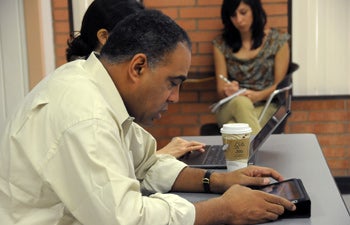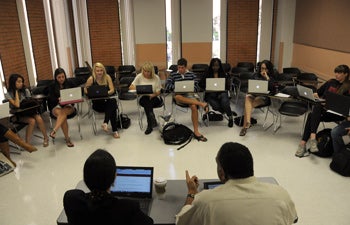At the Forefront of Change
Swapping jeans and graphic T-shirts for suits and ties, 21 USC Dornsife students ascended the steps of the California State Capitol. After months preparing for the final presentation, students in the freshman seminar “It Ought to Be a Law” provided testimony on a bill they authored and successfully introduced to the Senate. The bill passed unanimously once the students negotiated amendments during their testimony.
Senate Bill 63, “USC Saving Hearts,” introduced April 6 by Sen. Curren Price (D-Los Angeles), will require all California public high schools to have at least one automatic external defibrillator (AED) on campus for use in emergency situations that may occur during school-sponsored athletic activities. The program will make schools responsible for maintaining the devices, preparing a written emergency preparedness plan and providing staff training.
“Their presentation was inspiring and in fact better than many professionals I have seen,” said retired senator and USC Dornsife Politician-in-Residence Kevin Murray. “They were able to negotiate amendments on the fly to get the bill passed.”
The idea of charging students with drafting legislation originated with Murray, who wanted them to be involved with policy making firsthand.

Retired senator and USC College Politician-in-Residence Kevin Murray speaks to students in the College’s Freshman Seminar “It Ought to be a Law.” Photo by Jie Gu.
Murray’s experience and knowledge was valuable to the process. He represented the 47th district when elected to the California Legislature in 1994. After serving two terms, he was elected to the State Senate representing the 26th district before retiring due to term limits in 2006.
Under the direction of Murray and Nina Rathbun, lecturer in international relations, the first-year investigations course allowed students to explore the workings of and get involved in California politics. Writing legislation, drafting amendments and preparing findings have been a few of the assignments. They also prepared declarations, drafted letters and recruited support of organizations and individual experts interested in the legislation.
“They will have hands-on knowledge of how California politics work and also gain contacts and networks as many of them hope to pursue careers in policy or politics,” explained Rathbun, who previously served as a foreign affairs officer for the U.S. State Department on Multilateral Nuclear Nonproliferation.
Murray and Rathbun drew from their personal experiences, knowledge and contacts to help students see the bill to the senate floor.
“I believe this is a rite of passage from being a freshman to actually feeling like we have the power to contribute to society,” said Aleksandra Vidisheva, an economics major.

Students in the College’s “It Ought to be a Law” class will fly to Sacramento to provide testimony on a bill they authored and successfully introduced to the Senate. Photo by Jie Gu.
When tasked with brainstorming draft legislation, students pulled from personal experiences with the intent to impact California high schools. The class unanimously agreed to focus on placing AEDs in secondary schools after conducting extensive research.
AEDs are portable devices that help re-establish normal contraction rhythms of the heart by giving the muscle a sharp shock. The user-friendly machine that guides users with voice and audio prompts has the potential to save up to 90 percent of victims when properly administered within the first minute of cardiac arrest.
“We thought this would be the most meaningful way to affect a lot of people and we thought it would be a reasonable and important bill to get passed,” said Navtej Singh, a double major in political science and economics. “It’s time for a change we can see and it’s a difference we are all making.”
The bill carries personal significance for David Henney. Last spring, during his senior year at Loyola High School, he witnessed his friend collapse on the soccer field.
“He would have died if it wasn’t for a defibrillator available close by,” recalled Henney, an international relations major.
In Sacramento, students testified before the Education Committee. Using statistical facts and studies from several organizations such as the American Red Cross, and the National Heart, Lung, and Blood Institute, they successfully advocated for SB 63.
In addition, the students lobbied legislators, rounded up support from external groups and negotiated amendments with committee staff, opponents and legislators.
The students’ initially presented the bill to Price and his legislative director, Reginald Fair. Price was won over and agreed to introduce the bill on the Senate floor. Price provided guidance on recruiting support, drafting the fact sheet and writing the letter of support.
In response to the current budget crisis, the students are exploring, creating or partnering with foundations to raise money to fund the policy. Most of the students are continuing their work after the class has ended. All of them were offered internships with Price. Two have started their internships, a handful will start over the summer and a few will start next semester.
The bill will proceed to several committees before moving to the Senate floor and the House.
“I know that we will be saving lives in the long run,” Henney said. “There’s no doubt in my mind.”